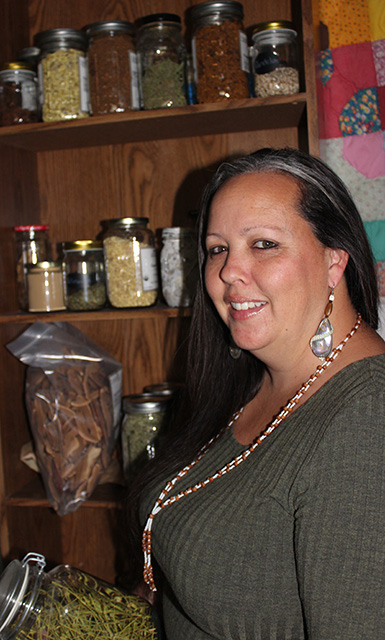Covid19, Coping, Community
An interview with San Diego area professor and Lone Pine Paiute-Shoshone native Kiana Maillet
Kiana Maillet is a member of the Lone Pine Paiute-Shoshone Tribe where she is a Tribal ICWA Representative and part of the Cultural Resource Protection Committee. Maillet holds Masters Degrees in Social Work (MSW) and Public Administration (MPA), Bachelors Degrees in Psychology and Child Development, and she is currently a doctoral student in a joint program through UC San Diego and CSU San Marcos studying Educational Leadership. Professionally, Kiana is a Licensed Clinical Social Worker and an Adjunct Professor. She has extensive volunteer and work experience working with youth, families, and communities in need.
Indian Voices: Can you tell us about some of the challenges you see people dealing with regarding distance education during the Covid19 quarantine in your community?
Kiana Maillet: People are experiencing so much stress right now. A lot of people don't have the equipment for online learning, and if they have the equipment they often don't have the knowledge of how to use it and all the different programs that are needed. That goes for the students as well as the teachers. Many of the teachers themselves are learning how to do online teaching for the first time, which is a lot of hard work. I've taught online for 6 years, and online teaching is at minimum, twice the work. A lot of students may not have access to the internet and at the same time, with their families at home, they may not have a quiet place to do their studies. Everyone's situation is different. You're talking about laptops, tablets, P.C.s and getting online. Then on top of that you have people faced with this trauma. It's hard for students to focus. There's so much anxiety out there, a lot of worry, and learning online takes focus and good time management skills.
Indian Voices: Can you talk about some of the challenges instructors are dealing with in teaching online?
Maillet : First you have to build the curriculum and then you have find ways to make it engaging with your students. It's really not the same interaction as if you're in the classroom talking back and forth. You have to do it in a way that's interesting and engaging in the midst of all this chaos that's happening. We also have to go back and keep them engaged and so you have a lot more grading. My son started his online education this morning and he's in fifth grade and I see what their struggles are. I see the teachers are struggling to use the programs that they've never used before and have a short time to learn how. Sometimes, like for Google documents, the teachers don't know how to make them editable for the students. They're not familiar with the software on either end, and because I'm an online teacher I'm able to tell my son that it's okay and not to worry about it because his teacher didn't know how to do this but she'll figure it out. But every child might not have somebody who understands this and can explain it to them. There's two different styles of online teaching: One is asynchronous where you basically put the class work out there and they can do it on their own time; and the other kind, which is actual online sessions where we’re all online at the same time. Like in the doctoral program I’m in now, we have a time where as a cohort we meet together online. If I were doing that kind of real-time education I would try to keep the students engaged and ask them questions because I don't think anybody likes just straight lecture. Also, lecturing for the first time by video is different and not everybody has that skill set.
Indian Voices: Do you try to prepare your own children for the hiccups and obstacles the teachers are confronting?
Maillet: Yes, I tell my kids the instructors are people too, and they get worried about making mistakes and so they have their own struggles and stress going on.
Indian Voices: Are you teaching at University this semester?
Maillet: I teach for the San Diego Community College District. For me it's fine because I've been teaching online for years so this isn't something new, but I totally understand the struggles that teachers are going through. I can't imagine being thrown into this instantly and having to figure it all out. Plus for the native community there are already cultural histories and present realities that are challenging, and it's hard for me to say because there's so many cultural issues, so many racial issues, micro-aggressions and unwelcoming environments attached to race. Our whole education system has issues outside of what is happening with Covid 19. I imagine that one-on-one is very important for these students, and so it’s a big deal to have that diminished from the support that's needed. I can see that from the University level there are safes spaces for the students to gather and meet on campus , and so with the online format, some of them don't even have safe spaces where they feel okay now at home.
Indian Voices: Right, with your background in social work, what is your take on being forced to stay at home with regard to things like domestic violence and child abuse?
Maillet: Having to stay home can be a blessing and a curse at the same time. On the positive side, people get to spend time together. But they're doing it under this immense amount of stress and I imagine that some families are struggling with that. There are people living in small spaces and you know, they have to all be in the same room at the same time, all the time, and they need alone time. They need that space for their own mental health. Some people don't have yards or have places they can go safely be outside. And there are stressed out adults in the home.
Indian Voices: And stressed adults often turn to alcohol which can be calming, but it’s pretty well documented that alcohol use is often a precursor to domestic violence. Can you speak to the issue of domestic violence during the Covid19 lockdown in Native American communities?
Maillet: There's a lot of challenges there because one of our safety nets, and not just for children, but also for battered spouses are things like in-person doctor visits or going to school where children are around other people and have time seeing them face to face. During lockdown these things aren't happening. The same safety nets aren't there because people aren't seeing it so they're not reporting it. And they're not being connected to resources either. And you know it's not so easy to make that phone call for help. When somebody actually physically sees you and sees that something's wrong they can report it but not if you’re in isolation.
Indian Voices: I understand there are some barriers to prosecuting men of domestic violence on tribal lands because authorities are unsure who has jurisdiction. Has that situation improved any?
Maillet: Well now, domestic violence isn’t just men against women. It can be women against men or men against men, women against women. Domestic violence can occur between any people.
Indian Voices: I stand corrected and rightly so. Thank you for that. Have inroads been made legally on those fronts? Has prosecutorial power been expanded, clarified?
Maillet: Yes, that came with the Violence Against Women Act. For domestic violence and child abuse on the reservations. But there’s still work to be done. There's tribal law and federal law, and it's hard for a lot of people to understand the differences, including the people that work within the systems.
Indian Voices: At the NAJA conference last summer it was stressed that Native journalists should be reporting success stories, especially those of models which could be duplicated. Is there anything like that you can talk about?
Maillet: There's a lot of positive work between the social workers and the tribes. There’s actually a very good agency out here in San Diego called the Indian Specialty Unit. It’s great that we have them but they’re a small unit.
Indian Voices: Culturally speaking, what are some of the ways the Covid pandemic is affecting your extended community?
Maillet: A lot of our social gatherings are being cancelled or postponed and that is where social support is usually found. You know, our pow wows, our gatherings, different family events. We all go to family events, and so I see a lot of people struggling with just not having that support of getting out there and being with their people. Also, many tribal communities have always been matriarchal. The women were the leaders but because of colonialism those matriarchal roles were diminished somewhat. They would only speak to our people’s men, not our women. But the women had that leadership. The women supported our people and I don't feel like their voices are muted. But I feel like they didn't have the power to lift their voices to lead their communities, to support their communities.
Indian Voices: Is the matriarchal presence and influence there today?
Maillet: I see some of the toughest people I've ever met just break down around their grandmothers. Sometimes at the reservations, the houses are really far apart so you don't even have neighbors to see and hear what is going on. In my experience, a lot of people behave better when they're around certain family members. It’s tough without our gatherings. I don't want to go with a complete negative perspective because we're such an amazing, resilient people. And you know we've been adapting as well, finding ways to communicate with each other and support each other. I suggest people call and text each other. The other day, one of my nieces reached out and just said “hi, how you doing?” and that's just really empowering, and heartfelt, and I love it. So there's good things coming out of this too.
Indian Voices: Thank you so much for taking the time to speak with us. Is there anything we didn’t touch on that you’d like to address during this challenging time of the Covid19 pandemic in Indian Country?
Maillet: I think that our communities need to understand that we're in a traumatic time right now, and that they need to know that it's okay if we're not as productive as we’d like to be. It's okay to focus on ourselves and care for ourselves. It's okay if we make mistakes, you know as people, we need to be very forgiving of ourselves at this time. If we can’t work, we can find other purposes and other meaningful ways to spend our time. I feel like we're almost going back to that old-time living where we don't have a grocery store and we got our beans, we have our rice. We have our flour, our commodities and we can survive on this for months if we need to.
Our Garden is a sacred place. I go out to visit and talk with the plants daily and organize the library of roots and herbs alphabetically. It is a fun, uplifting family affair that we enjoy with humor while joking around. We have shot glasses and we sit around and do shots of elderberry syrup. We make it fun.






